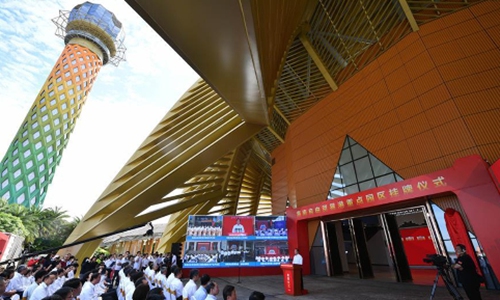Building Hainan into free trade port won't harm HKSAR
Source:Global Times Published: 2020/6/8 21:18:40

Photo taken on June 3, 2020 shows the unveiling ceremony of key industrial parks, in Haikou, south China's Hainan Province. A batch of key industrial parks were unveiled on Wednesday in China's island province of Hainan, in an effort to promote the construction of the Hainan free-trade port. The 11 key parks around the island cover three major fields, including tourism, modern services and advanced technologies. China on Monday released the development plan for the Hainan free-trade port, aiming to build Hainan into a globally influential, high-level, free-trade port by the middle of the century. (Xinhua/Guo Cheng)
The nation's master plan to build South China's Hainan Province into a free trade port will not have a negative influence on the Hong Kong Special Administrative Region (HKSAR) as the two regions have different positions and supportive industries, and their relationship is a complementary one, not a rivalry, Chinese officials said.
The comments were made at a press briefing of the State Council Information Office on Monday. The briefing provided a detailed interpretation of a mega plan, which China released on June 1, to build its southernmost province into a world-class free trade port, with a major focus on financial opening-up.
Lin Nianxiu, deputy minister of the National Development and Reform Commission, China's top economic planner, said at the press briefing that Hainan will learn from HKSAR, Singapore and Dubai, which are representatives of high-level global free trade ports.
Lin stressed that Hainan's position is different from Hong Kong's.
"Hong Kong is an important global financial, trade and shipping center… In Hainan, we will fully utilize its edge in abundant natural resources, its unique geographic position and its proximity to a massive mainland market to facilitate trade and investment while promoting the development of the tourism, services and high-tech industries," Lin said.
Analysts suggested that Hainan and Hong Kong could complement each other in sectors such as finance, education and healthcare.
"It's not the rise of Hainan and the fall of Hong Kong. In financial markets, Hong Kong's main edge lies in free capital conversion and flows, as well as hedging mechanisms. Foreign investors will tend to invest in the secondary market in Hong Kong while setting up high-tech venture capital firms in Hainan," Liang Haiming, dean of the Belt and Road Institute at Hainan University, told the Global Times on Monday.
Liang noted that some Hong Kong-based companies may also open subsidiaries in Hainan to tap more opportunities.
In the next step, Lin said that Hainan will strengthen coordination with the Guangdong-Hong Kong-Macao Greater Bay Area for joint development. "We will work together to ensure Hong Kong's security and long-term stability and prosperity. We will ensure the implementation of 'one country, two systems' principle."
Liu Cigui, Party chief of Hainan, stressed that the Hainan free trade port would be one under "the system of socialism with Chinese characteristics."
"From any ideological perspective, we will not allow any moves that jeopardize national security or hamper [China's] socialist construction," Liu noted.
Under the free trade port plan unveiled last week, Hainan will encourage free flows of six elements including trade, investment and cross-border capital. Goods will be subject to zero tariffs, and service providers will be allowed to access and operate in the market.
Liang said that the building of the Hainan free trade port could serve as a new growth point for the Chinese economy amid a global downturn. It will also pave the way for China to have a greater say in global trade rules as US-led protectionism is on the rise.
Posted in: ECONOMY,BIZ FOCUS,MORE 2